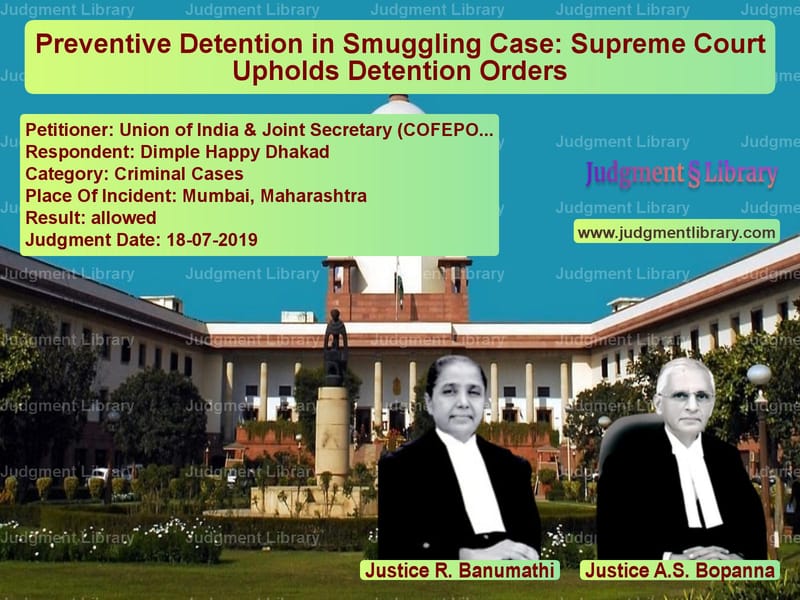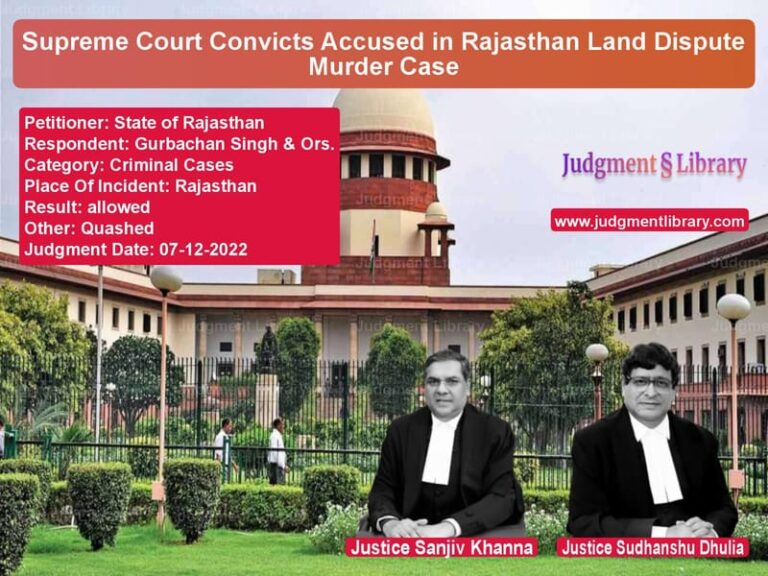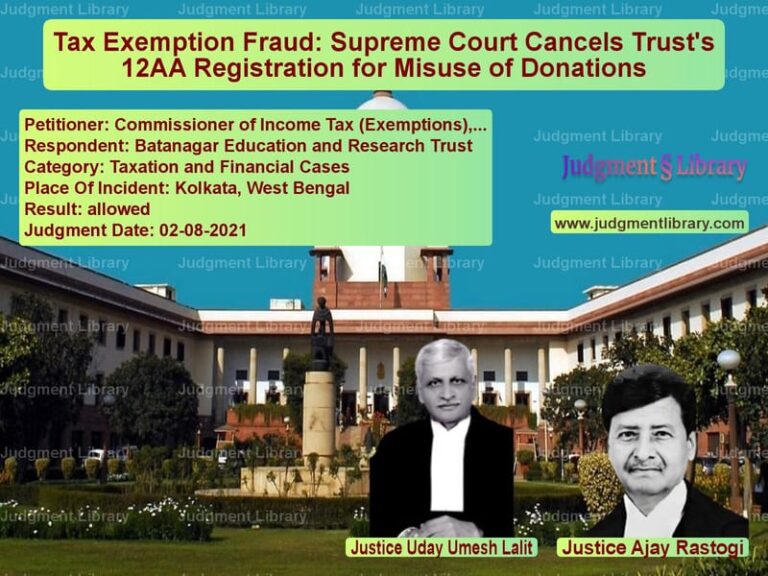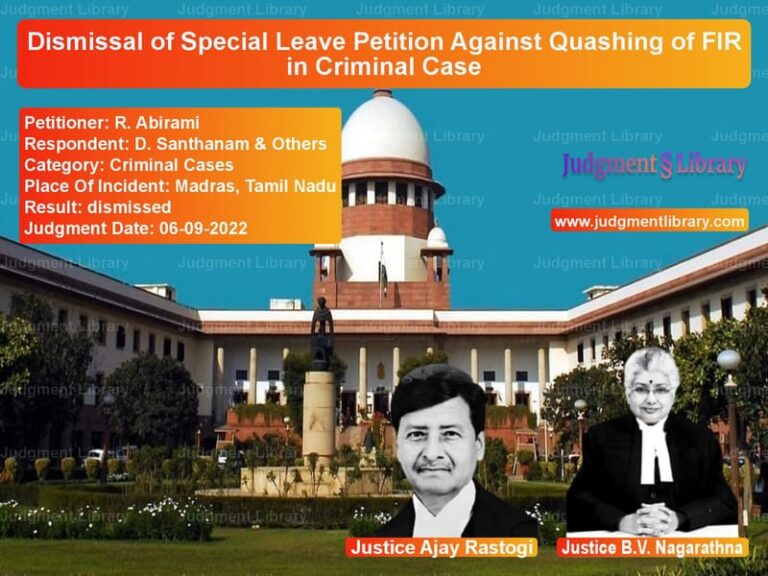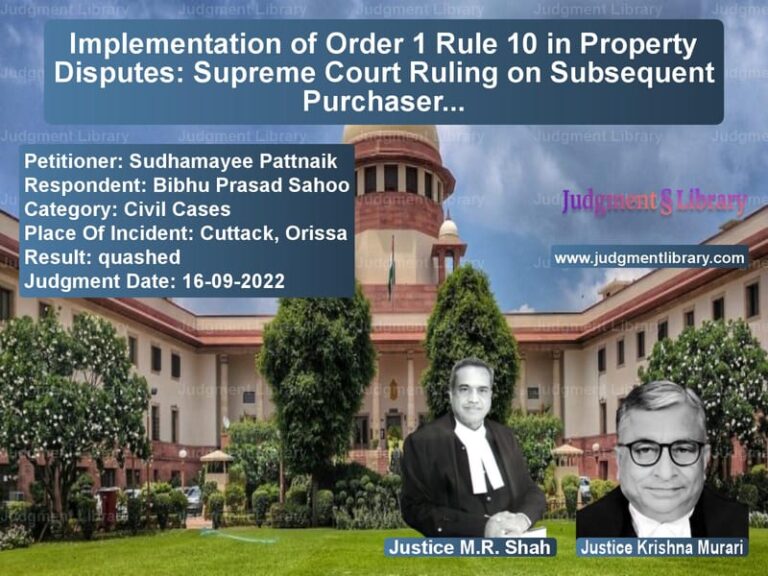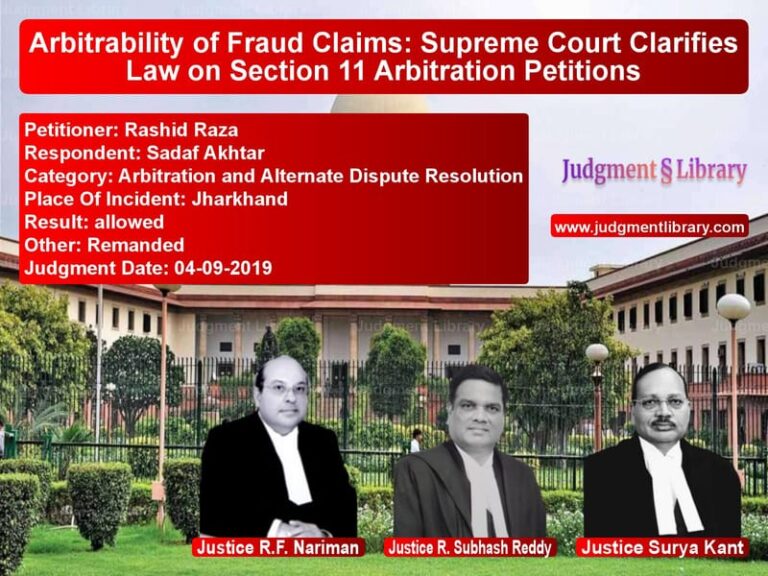Preventive Detention in Smuggling Case: Supreme Court Upholds Detention Orders
The case of Union of India & Anr. vs. Dimple Happy Dhakad is a significant ruling concerning preventive detention under the Conservation of Foreign Exchange & Prevention of Smuggling Activities Act, 1974 (COFEPOSA). The Supreme Court upheld the Union of India’s appeal, setting aside the Bombay High Court’s decision, which had quashed the detention orders against the respondents accused of gold smuggling.
The case revolved around an international gold smuggling syndicate, where large quantities of gold were smuggled from the UAE to India through various channels. The government alleged that the detenues played a crucial role in facilitating and concealing smuggled gold, prompting the detention orders under COFEPOSA. The Supreme Court reinforced the validity of preventive detention to curb smuggling activities that significantly impact the nation’s economy.
Background of the Case
The Directorate of Revenue Intelligence (DRI) launched an investigation into a gold smuggling syndicate operating between UAE and India. The key events in the case are as follows:
- On March 28, 2019, the DRI intercepted two vehicles in Mumbai, seizing 75 kg of gold discs valued at Rs. 24.5 crores.
- Follow-up searches in offices and residences led to the discovery of an additional 110 kg of gold and unaccounted cash worth Rs. 1.81 crores.
- Key players in the syndicate, including Shoeb Zarodarwala and Abdul Ahad, named the respondent, Nisar Aliyar, as the mastermind behind the smuggling operation.
- Happy Dhakad, a jeweler, was identified as a recipient of smuggled gold, which was later sold through multiple jewelry outlets.
- On May 17, 2019, detention orders were issued against the respondents under COFEPOSA to prevent them from engaging in further smuggling activities.
- The Bombay High Court quashed the detention orders on June 25, 2019, citing a lack of proper reasoning and procedural lapses.
Petitioner’s Arguments
The Union of India, represented by the Additional Solicitor General, presented the following key arguments:
- The detenues were key members of a smuggling syndicate responsible for smuggling more than 3300 kg of gold worth Rs. 1000 crores between 2016 and 2019.
- They facilitated the illegal movement of smuggled gold and laundered the proceeds through hawala transactions.
- The detention orders were necessary to prevent them from continuing such activities in the future.
- The High Court erred in quashing the detention orders based on procedural technicalities, undermining the purpose of preventive detention.
- Although the detention orders and grounds of detention were served on May 18, 2019, the relied-upon documents were served within the statutory time limit under COFEPOSA.
- The delay in providing some documents was justified due to the voluminous nature of evidence, which ran over 2300 pages.
Respondent’s Arguments
The respondents, through their legal representatives, countered with the following points:
- The detention orders were illegal as they failed to satisfy the requirement that detenues were likely to be released on bail and continue smuggling.
- The detaining authority did not provide relied-upon documents along with the detention orders, violating their right to make an effective representation.
- The Bombay High Court correctly ruled that the orders lacked proper reasoning and violated constitutional safeguards.
- The alleged role of the detenues in smuggling was based on statements extracted under coercion, which had no evidentiary value.
Supreme Court’s Observations
The Supreme Court bench, comprising R. Banumathi and A.S. Bopanna, analyzed the procedural and substantive aspects of the detention orders. The Court made the following observations:
- The High Court’s ruling that preventive detention orders must explicitly state that the detenue is “likely to be released on bail” was incorrect.
- The detaining authority had sufficient material to justify its satisfaction that the detenues had a high propensity to continue smuggling if not detained.
- The detention orders were issued based on substantive evidence, including surveillance data, financial records, and confessional statements.
- The Court acknowledged the challenge in preparing and serving over 2300 pages of documents within a short time and held that the statutory time limit under COFEPOSA had been complied with.
- The purpose of preventive detention is not to punish but to intercept unlawful activities, ensuring national security and economic stability.
Critical Judgment Excerpt: “Preventive detention is devised to afford protection to society. The object is not to punish a man for having done something but to intercept before he does it, and to prevent him from doing so.”
Final Decision
The Supreme Court allowed the appeal by the Union of India and restored the detention orders. The key rulings were:
- The High Court erred in setting aside the detention orders based on procedural issues.
- The detenues’ involvement in smuggling activities was established through credible evidence.
- Preventive detention under COFEPOSA is justified when authorities have a reasonable apprehension that the accused will continue illegal activities.
- The statutory period for serving relied-upon documents had been complied with, making the detention orders valid.
Implications of the Judgment
This ruling has significant implications for preventive detention laws and their application in economic offenses:
- Courts must balance individual liberty with national security when reviewing preventive detention orders.
- Authorities must ensure procedural compliance while issuing detention orders but should not be unduly constrained by minor delays in serving documents.
- Smuggling activities that affect economic stability warrant stringent preventive measures under COFEPOSA.
- Detaining authorities must carefully document the rationale behind preventive detention to withstand judicial scrutiny.
The Supreme Court’s decision in Union of India vs. Dimple Happy Dhakad reinforces the principle that preventive detention is an essential tool to combat organized smuggling networks. The ruling underscores the importance of balancing procedural safeguards with the need to prevent economic offenses that impact national security.
Petitioner Name: Union of India & Joint Secretary (COFEPOSA).Respondent Name: Dimple Happy Dhakad.Judgment By: Justice R. Banumathi, Justice A.S. Bopanna.Place Of Incident: Mumbai, Maharashtra.Judgment Date: 18-07-2019.
Don’t miss out on the full details! Download the complete judgment in PDF format below and gain valuable insights instantly!
Download Judgment: Union of India & Joi vs Dimple Happy Dhakad Supreme Court of India Judgment Dated 18-07-2019.pdf
Direct Downlaod Judgment: Direct downlaod this Judgment
See all petitions in Money Laundering Cases
See all petitions in Judgment by R. Banumathi
See all petitions in Judgment by A. S. Bopanna
See all petitions in allowed
See all petitions in supreme court of India judgments July 2019
See all petitions in 2019 judgments
See all posts in Criminal Cases Category
See all allowed petitions in Criminal Cases Category
See all Dismissed petitions in Criminal Cases Category
See all partially allowed petitions in Criminal Cases Category

